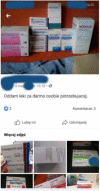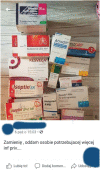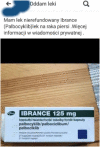Facebook as a source of access to medicines
- PMID: 36227918
- PMCID: PMC9560064
- DOI: 10.1371/journal.pone.0275272
Facebook as a source of access to medicines
Abstract
Over the last decade, we've observed an enormous social media development, which have recently become commercial services. Hence, we aimed to verify if Facebook might be considered as a source of access to medicines. We also intended to identify prescription (Rx) and over the counter (OTC) medicines if available on that platform. The study was conducted from January 2019 to July 2020. We investigated offers of pharmaceuticals posted on Facebook (individual posts and communities) between 2016 and 2019. Medicines were divided into Rx and OTC brands and in accordance with their possible therapeutic use. We verified whether the medicines were for sale, to exchange, or available for free. Posts and groups were investigated for example, by entering the phrase "for free," followed by a city in Poland. Out of 409 offers, 380 (92.91%) concerned Rx brands and 29 (7.09%) OTC brands. 315 (77.02%) medications were available "for free". In 47 (11.49%) cases, an "exchange" was expected, and 47 (11.49%) announcements were marked as "for sale". Cardiovascular medicines (n = 125; 30.56%) were the most popular. There were also antidiabetics (n = 38; 9.29%) and antipsychotics (n = 28; 6.84%). We also found clear candidates for misuse. These were opioids (n = 7; 1.71%), benzodiazepines (n = 2; 0.48%), clomifene (n = 1; 0.24%), and letrozole (n = 1; 0.24%). Facebook provides the possibility of uncontrolled access to medicines. The majority of offers concerned Rx brands, including opioids and benzodiazepines. Medicines offered on Facebook were mainly accessible for free. The scope and the number of medications offered on Facebook should make this issue a hazardous phenomenon.
Conflict of interest statement
The authors have declared that no competing interests exist.
Figures




References
-
- Shabot MM. Medicine on the Internet. Proc (Bayl Univ Med Cent). 2001;14: 27–31. Available: https://www.ncbi.nlm.nih.gov/pmc/articles/PMC1291308/ doi: 10.1080/08998280.2001.11927727 - DOI - PMC - PubMed
-
- Emma Hammett. Online Drug Addiction & Misuse: new rules to combat misuse. In: Online First Aid [Internet]. 9 Apr 2019 [cited 9 Jul 2020]. https://onlinefirstaid.com/online-drug-addiction/
-
- mckesson-europe-otc-medicines-sales-data-data.pdf. https://www.mckesson.eu/mck-en/resource/blob/24540/7a53568c088bf726ba088...
MeSH terms
Substances
LinkOut - more resources
Full Text Sources

